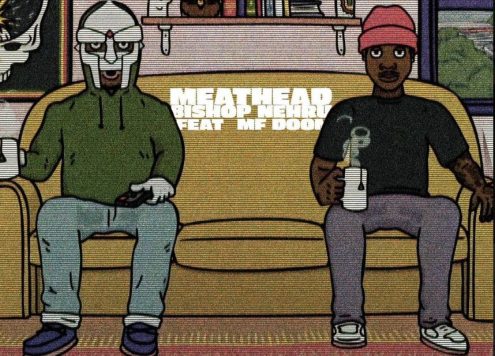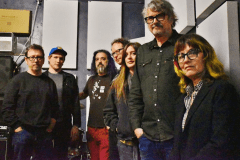Back to normalcy, but not really. We’re slowly creeping along as many on social media have turned into scientist and medical professionals thanks to YouTube videos and hearsay regarding COVID-19, which isn’t the 19th version of the virus like some government officials have believed, as well as others. It’s exhausting. I myself never claimed to have all the answers but if I have questions, I’ll make sure to ask my doctor friends in the thick of it all, in New York.
If there’s a question you have, ask a professional and avoid YouTube because your friend that graduated high school isn’t as knowledgeable as the doctor who has actually been practicing medicine for years with multiple degrees under his/her belt. Just search for a little clarity and it may soothe your nerves. No, I’m not here to preach to the choir, that’s for others to do on their soapboxes. We’re just trying to give you some sense of that normalcy with what we do here.
But if you’d like to pass the time forgetting about the world around you, Utah’s Choir Boy drop its latest release Gathering Swans (Dias Records). The boys from Salt Lake City play with 80s nostalgia on their latest release with over-the-top cooing vocals and pop synth beats. Vocalist Adam Klopp seems to know no bound on “Complainer,” allowing his range to drift all over the track, and it works. Nothing is lost with the electronic drum patterns. In fact, it’s fitting for songs like “Nites Like This” where Chaz Costello’s synth-induced bassline takes front stage here, driving the song off into desolate highways. But I don’t think there’s anything sweeter than “Sweet Candy,” where Klopp channels his inner Andy Bell while guitarist Michael Paulsen holds tight to the Bernard Sumner guitar influences here. For 2020, the band’s album is pretty infectious, no pun intended.
25 years after its full-length debut, Splay (deSoto), is the Shiner poised for a comeback of sorts? The band’s last release was 20 years ago but if George Foreman was able to make a comeback and win the heavyweight title, and now Mike Tyson is sharpening up his anvilic fists for his return, why not? Schadenfreude is the new release and while the post-hardcore band is still good at what it does, I’m not sure it really is enough to captivate an entirely new group of music listeners. The heavy and ethereal vibe is captured throughout the new album but it’s difficult to find something thought-provoking. Sure the band’s stalwart fans will be quick to grab a copy of the album because the guitars are on point as is the bombast of the rhythm section. The band does remain top of mind has been able to do things others can’t. “O Captain” differs from the rest of the album though, allowing a much sparser and sweet delivery.
Here I’ve been on the fence with the techniques, Markel Scott, known by his pseudonym Bishop Nehru, approaches music with for some time, but at 23 years old, it’s a feather in his own cap that anyone should question his years of writing, recording, and releasing more music than many his age could ever conceive of. Originally slated for release back in November 2019, Nehru was bogged down with label issues but Nehruvia: My Disregarded Thoughts, finally sees the light of day this week.
The album is probably his most ambitious to date and broken up into two acts which he refers to as “The Abyss” and “The Escape.” Much like Dante’s Inferno, but here in only two parts, the tone, the timbre, runs the gamut from melancholia to buoyant. His opener “Colder” allows the emcee to wax poetic, setting the tone for his self-reflection, using his words to press forward, all the while knowing his survival is based on his own wits. He expounds on that idea with the bouncy “In My Zone,” not as self-braggadocio but as exasperated hard work, allowing him to arrive at the pinnacle he has been due. The jazzy folk of the track “WhyDoesTheNightSkyTalk2Me” holds most of the subdued melancholy but it rages on the stormy “Little Suzy (Be Okay)” in music alone for the first minute and a half. That’s before the despair and hope of Nehru’s words are juxtaposed against a more upbeat rhythm. He does the same on “Too Lost,” with heady wording wrapped around a DJ Premier’s signature beat stylings.
The other side, the second half of the recording is upbeat and swings towards such hope, love, and beauty, it would be difficult to ignore. “Our Energy Is Astral” is a wondrous love song. The musicality of it bounces along with guitars picking and strumming and Nehru’s staccato words filtering in and out. All that while “All Of My Years” sounds surreal, coming from the young rapper/musician. “Me And My Thoughts” has a pastiche of sound, pieced together with Nehru dropping a continuous flow of words completely in his own zone. And then, of course, we have “Meathead” which features DOOM, that masked emcee. Both artists rhyme over fiery sample-heavy beats with subtle stop/starts.
Bishop Nehru pulls and takes from boom-bap sources he’s familiar with and allows his new Nehruvia: My Disregarded Thoughts to be firmly footed within 2020. It’s filled with thoughtful lyricism and a wide array of musical backdrops that should allow this joint constant and consistent play for years to come. That’s never an easy task.
Facebook | Twitter | Instagram
If we’re being honest with one another, I’ve lost touch with a number of things. Music sometimes slips between the cracks and when someone takes an extended hiatus or retires from music altogether only to resurface, I sometimes lose interest. That’s a fact. But… The last album in my possession by Denison Witmer was 2003’s Recovered, which I was excited about because you know, Philadelphia Songs. Now I must interject, if this 2002 release leaves you scratching your head, search it out because it’s one of those albums whose sheet music should be woven into life itself. After his 2003 release, Witmer and his music vanished. It was rumored he gave up on music but fortunately, music never gave up on him. There was still work to be done and he resurfaced in 20012 with The Ones Who Wait and The Ones Who Wait II. I, unfortunately, didn’t wait but the years have allowed him to hone his skills even more so with a number of releases which is followed by American Foursquare (Asthmatic Kitty), his new full-length release.
Now with his new album, and this rarely happens, I’m left almost speechless. The majesty in which the delicacy of how the instruments are interwoven together, combined with Witmer’s sweet vocal tone, it’s all extremely inviting and lacks nothing. Much like labelmate Sufjan Stevens, he works his guitar around additional instrumentation when it’s fitting, flirting with beauteous sounds, like on “River of Music.” It doesn’t rage, it’s serene, like many of the songs here, with strings and piano lingering in the background but never allowing the acoustics of his guitar to be overrun. But I keep going back to piano-driven and harmony-filled “Catalina Love.” The song is nostalgic but contemporary as Witmer’s voice drips with sentiment.
But it’s “Confident Sensitive Child” that shows how fatherhood is a good look for Witmer. He pulls from his own story and sprinkles all the love around it. His line, “why would you cage an animal that wants to run wild” is so poignant and digs deep. The strings that wrap around guitars, with notes that drift with intention are amazing. But “Birds Of Virginia,” once again led by piano, is a love song that’s direct, filled with harmonies, more strings, where Witmer has all the right words to say.
As rediscoveries go, Denison Witmer is one that shouldn’t be lost in the pages of time and forgotten. American Foursquare has arrived in order for me to rediscover his back catalog, and Philadelphia Songs sound even sweeter now than it did when I first heard it. Bit Witmer’s new album, it’s surely one of the best releases of the year.
Facebook | Twitter | Instagram
People take such a simple thing as a name and refuse to do their homework on it. I mean, it isn’t that difficult, just utilize the tools that are in front of you to find out, “I wonder if there’s another band that has been using this name?” It really is the easiest thing to do. Ruins, Braid(s), Lovechild, etc. the list can go on and on. Which brings me to the latest release by another group that shares a name with another group. From the same town.
To be fair, this isn’t a “which came first, the chicken or the egg?” moment. Cup, fronted by Tym Wojcik, received attention from his label February of 2017 with the Puc release. So yes, they’re the rightful heirs to the Cup apparent. Not sure that my word is bond but regardless, no one’s really going to give a shit, except maybe me. I had the distinction of writing about Wojcik’s additional 2017 release Hiccup, on which he was the sole member. Three years later and Cup is a full-fledged band, a quartet that helps round out the Cup sound. Along with Tym on guitar/vox are Freddie Wyss on bass, Chad Sardashti on synth and guitar, and Kelsey Chapstick hitting drums, I must note there was a release between the group’s new Nothing Could Be Wrong (Aagoo) and Hiccup entitled, Jitter Visions, which I was not made aware of. It happens. From Jitter to Nothing, it seems like a seamless transition from one album to the next. I’ve actually gone back to listen to the band’s sophomore release for its label and I’m glad I did. It’s like getting two albums for the price of one, but it’s Nothing we’re here to focus on.
The band has honed itself into a slithering creature of a band, sliding in and out, creating a heady collection of songs. As the guitar distortion works its trashy sound around, I’m reminded of clashing garage rock sounds I’ve only heard a few times. While the Cup may fill my belly with nostalgia, it’s only coincidental because the band rages on with a fury unchained. The band opens with “Night Lite,” wickedly unraveling around the rhythm section’s repetitive vibe slinking in before guitars obliterate eardrums with overdriven guitars. But the band doesn’t always set guitars to 11, the much more melodious “When We Ride” takes us on an addictive trip, soothed by instruments wrapped around this garage rock ditty and incinerates everything in its path with Chapstick’s drums taking a much more prevalent role here. And “Swarm” is a different beast altogether as it revolves around Sardashti’s ethereal synth. There’s nothing lost in translation within the confines of the album as the song blends in well with the others.
Cup has a lot to offer up with Nothing Could Be Wrong, clearly challenging itself and avoiding one-trick-pony movements. The album is surrounded by a lot of darkness with semblances of light peeking in from time to time. But this one right here, is pretty intriguing. Long live Cup, the only one that matters.









Social Media